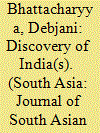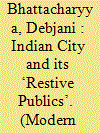|
|
|
Sort Order |
|
|
|
Items / Page
|
|
|
|
|
|
|
| Srl | Item |
| 1 |
ID:
162466


|
|
|
|
|
| Summary/Abstract |
The four essays in this special issue focus their attention on excavating particular strands within Indian historiography that look askance at the existing schools of thought be they nationalist, Marxist, or subaltern. However, this is not a project of recovering the forgotten or arranging these events into a long shelf of fragments that disrupt the unified history of the nation-state; rather it is a project of discovering various moments that went into the making of India-projects that were elite but forgotten; projects that were for the forgotten peoples of India, but ironically remembered only by a handful elites, projects that speak of the European, but not the colonial, entanglements in the making of the thirties and forties and, finally, these projects unearth some of the conservative energies and impetus locked within our master- and counter-narratives of state-formation, liberalism, nationalism and democratic republic. The essays return to the biography of the nation, to resist not simply its homogenising impulses, but to ask critical questions about acts of remembering, commemorating and excising that go into the narration of the nation's biography.
|
|
|
|
|
|
|
|
|
|
|
|
|
|
|
|
| 2 |
ID:
177989


|
|
|
|
|
| Summary/Abstract |
How do we write about cities in a world of deepening inequality, real-estate geopolitics, and the planetary water crisis that is unfolding in parts of Asia and elsewhere? Indian urban studies, which began to gain ground as a legitimate subject of scholarly enquiry two decades ago, has now emerged as a site to study political society, state-making, and citizenship, and to offer rich accounts of how post-colonial urban governance and law-making work. In this review, I explore the powerful analytics developed in three recent books in urban studies: Anindita Ghosh's historical work on colonial Calcutta, Claiming the City: Protest, Crime and Scandals in Colonial Calcutta, c. 1860–1920 (2016); Asher Ghertner's geographical analysis of neoliberal Delhi, Rule by Aesthetics: World-Class City Making in Delhi (2015); and Nikhil Anand's ethnographic account of restive publics and citizenship in Mumbai, Hydraulic City: Water and the Infrastructures of Citizenship in Mumbai (2017). This recent scholarship on urbanization has moved away from earlier rubrics of segregation, biopolitical disciplining, and resistance to offer rich accounts of the frictions that make and unmake political societies, critical tools to study the life of law in post-colonial cities, infrastructures as sites for the production of citizenship, and new financial and legal assemblages of risk-management, building lobbies, and syndicates around which urban politics is swirling. These accounts also deepen our understanding of the long genealogy of the contemporary moment, including populism, electoral politics, and post-colonial state-making. Indeed, the future of urban studies in a rapidly urbanizing world should be one that helps us to understand the nature of politics, contestations around legalities, environmental crises, and new financial geographies of power and dispossession.
|
|
|
|
|
|
|
|
|
|
|
|
|
|
|
|
|
|
|
|
|